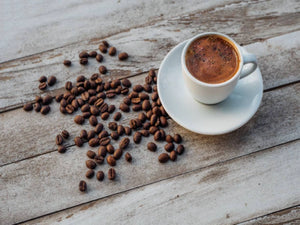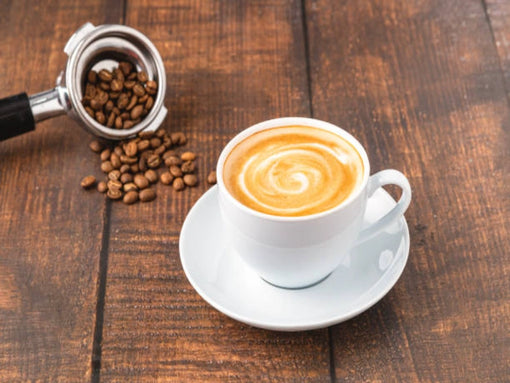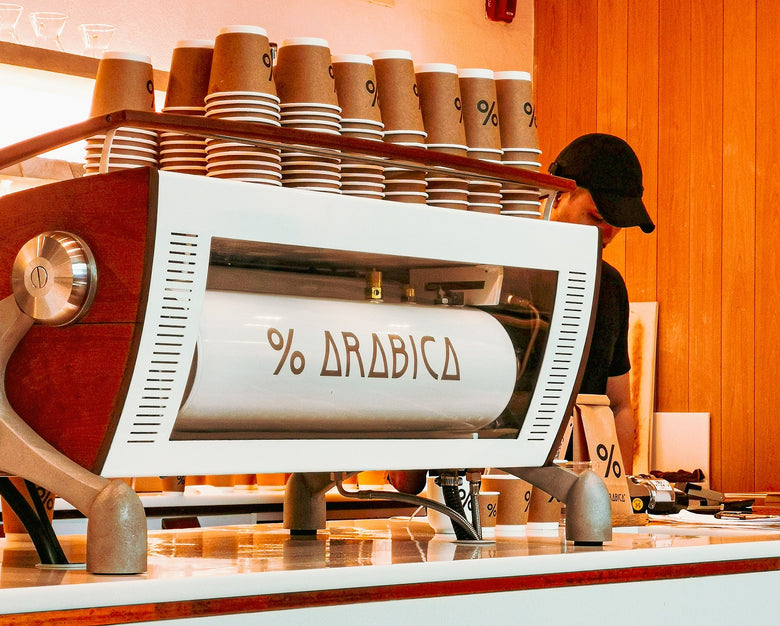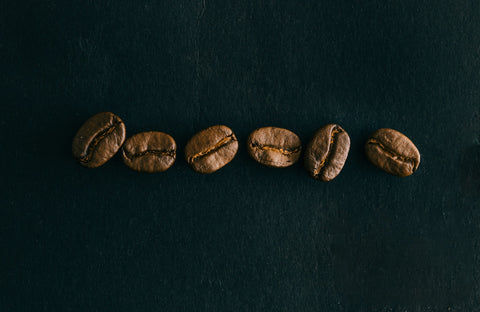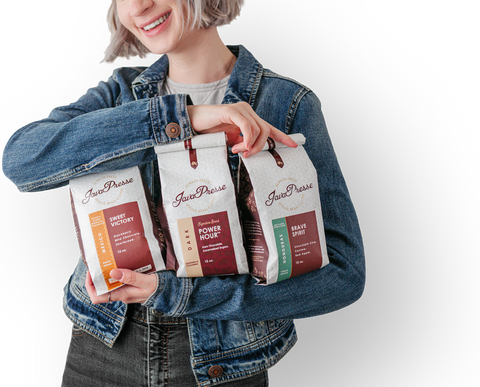You’ve seen it everywhere—on coffee labels, websites, TV commercials, and even billboards:
“We use 100% Arabica coffee beans!”
With endless coffee brands using this claim, doesn’t it make you wonder if Arabica beans actually live up to the hype?
Well, let us be the ones to shout it from the rooftops:
Arabica coffee is 100% worth the hype!
Arabica coffee beans are known for their myriad of mouth-watering flavors, smooth and delectable finish, and pleasant acidity. It’s no wonder coffee roasters everywhere travel the world seeking out the best Arabica coffee.
But, should you only buy from brands that sell Arabica coffee?
Yes! We’ll show you…
- What Arabica coffee beans are (+why the coffee industry loves them!)
- The difference between the two most popular types of coffee beans: Arabica & Robusta
- 5 things to look for when shopping for Arabica coffee brands
What Are Arabica Coffee Beans Anyway?
Many coffee drinkers believe that all coffee beans are the same.
Coffee beans come from the same plant, are ground up to a powder, and drowned in boiling water to produce our favorite hot bean juice… right?
Wrong!
Coffee comes from two main species of the coffee plant: Coffea Arabica and Coffea Robusta (or Canephora.)
Within each species are different varieties or mutations of the plant. Arabica coffee alone has hundreds of varieties including:
- Typica
- Bourbon
- Caturra
- Catuai
- Geisha
- Java
- Pacamara
(And that’s only a handful!)
The reason coffee drinkers and roasters alike love Arabica coffee is its variety.
Arabica coffee beans from around the world can boast flavors of crisp tangerine, tart lemon, smooth milk chocolate, and even delicate jasmine! Plus, these coffee beans can produce a luscious mouthfeel ranging from tea-like to creamy along with pleasant, vibrant, and bright acidities.
Essentially, the flavor possibilities with Arabica coffee beans are endless!
Arabica coffee also offers a variety of health benefits including warding off Type 2 diabetes and keeping our minds sharp well into old age.
So, What’s the Difference Between Arabica and Robusta Coffee Beans?
While there are several differences between Arabica and Robusta coffee beans, it all boils down to flavor and quality.
Arabica coffee makes up 65-75% of the world’s total coffee production, while Robusta coffee holds around 25% of the market. This large market disparity is due to Robusta’s lack of desirable flavors and coffee attributes.
Read: The Differences Between Arabica and Robusta Coffee
Flavor
Arabica coffee contains far more desirable organic compounds than Robusta coffee beans with:
- Two times more sugar
- Higher acidic content
- 60% more lipids
This is how we can produce sweet, exciting coffee bursting with flavor using Arabica beans.
Robusta beans, on the other hand, result in an overwhelmingly bitter flavor since they lack the organic compounds necessary to properly develop sweetness and delicious acidity in a cup.
By analyzing flavor alone, it’s not hard to see why coffee pros prefer Arabica coffee to Robusta coffee beans!
Quality & Pricing
Robusta coffee is far more resistant to plant diseases, climate changes, and other environmental errors than Arabica. This is why it is less risky for farmers to grow Robusta coffee in its respective regions (Vietnam, East Africa, Brazil.)
Additionally, this resistance to plant diseases and environmental changes means that Robusta coffee plants can yield more cherries on average.
However, because of its undesirable flavor, the value of green Robusta coffee is half as much as Arabica. Therefore, it’s far more advantageous for coffee farmers to take the risk and grow Arabica coffee.
Caffeine Content
When it comes to caffeine content, however, Robusta beats Arabica by a landslide. Robusta beans can contain up to 80% more caffeine than Arabica coffee beans.
However, if you’re only drinking coffee for the caffeine rush, you’re missing out on all that coffee can be!
More caffeine does not equal more flavor. In fact, it contributes to Robusta’s mouth-puckering bitterness.
Does This Mean You Can’t Trust Robusta Coffee Brands?
Not necessarily…
High-quality specialty Robusta coffee is available for sale. However, these coffees are extremely rare and unlikely to be on the shelves of your local supermarket. And, the exclusivity of this coffee is evident in the hefty price tag!
It’s also important to note that Robusta has historically been used in low-grade instant coffee and “gourmet” coffee blends.
Why? Because of the low price point!
Coffee companies focused on quantity over quality can buy mass amounts of Robusta for far cheaper than Arabica beans. Therefore, they’re able to produce commodity coffee blends using mostly Robusta coffee and a tiny bit of Arabica beans.
This is why it’s important to always read the label and be mindful of the coffee blend you’re buying—unless explicitly stated, you never know how much Robusta coffee is inside!
5 Things To Look For When Shopping For Arabica Coffee Brands
When it comes to your coffee selection, do you want a cup so flavorful that it’ll make you jump out of bed every morning? Or, would you rather a mediocre blend with a hint of flavor?
Hopefully, you chose the first option!
To ensure that every cup of coffee you drink is as delicious as the last, keep an eye out for these five things when buying from Arabica coffee brands.
Read: The Ultimate Guide to Buying Specialty Coffee Beans
1. 100% Arabica Coffee
Specialty coffee companies—like us!—want their fans to know that they use only the best coffee beans in their single origin roasts and blends. This is why our bags show coffee drinkers that we use 100% Arabica coffee in our blends.
The majority of (if not all) specialty coffee roasters only use Arabica beans to create their blends and lineup of single origin coffees. If you can’t tell by looking at the bag, ask your local roaster or barista what kind of beans they use.
2. Best By or Roast Date
On top of using the best beans available, Arabica coffee’s freshness has a major impact on the delightful taste in your mug.
Look for a Roast Date or Best By Date before purchasing the coffee. This will be an indicator of how vibrant and fresh the coffee will be when you drink it.
As always, fresh is best!
3. Coffee Quality
As with most agricultural products, Arabica coffee can still be grown poorly. Low-grade green Arabica coffee beans are sold at a lower price to roasters, but cannot be labeled as “specialty coffee” due to their quality.
If your coffee of choice uses 100% Arabica beans but is labeled as “gourmet” or “premium” coffee, you may want to consider buying from another roaster! These terms–although fancy sounding—are not synonymous with top quality coffee.
Read: Gourmet vs Premium vs Specialty Coffee: What's The Difference?
For undeniable flavor and a smooth finish, opt for freshly roasted specialty coffee from 100% Arabica beans.
(We happen to know where you can get some right now!)
4. Certifications
On top of selecting the finest Arabica beans, coffee roasters can seek out various certifications and accolades such as:
- Fair Trade USA
- Certified Organic
- Direct Trade
- Rainforest Alliance
- UTZ Certified
While these certifications aim to help those in the coffee industry, they do not have an effect on the quality of the coffee.
However, if these certifications mean a lot to you, search for coffees that adhere to these certifications and use Arabica beans, too.
5. Roast Level & Tasting Notes
Ultimately, you’ll want to look for Arabica coffee brands that offer the roast level and tasting notes you prefer.
Roast levels range from the delicate and vibrant light roasts to smoky, bold dark roasts.
And, tasting notes can range from sweet and nutty to citric and floral. That’s the beauty of specialty Arabica coffee—there are so many flavors to explore!
To know which tasting notes you like best, you’ll have to go through a bit of trial and error. Keep a journal chronicling each coffee you try. After trying coffees from around the world, you’ll know exactly what you enjoy in a coffee made from specialty Arabica beans.
There’s No Substitute for 100% Arabica Coffee
Sure, Robusta coffee has a place in the coffee industry and is great for an extra caffeine kick. But when you’re all about highlighting the natural flavors and high quality of coffee like we are, there’s nothing better than 100% Arabica coffee beans.
Taste the difference for yourself by signing up for a coffee subscription! You’ll have the opportunity to taste freshly roasted and expertly sourced coffee from the best coffee farms in the world.
